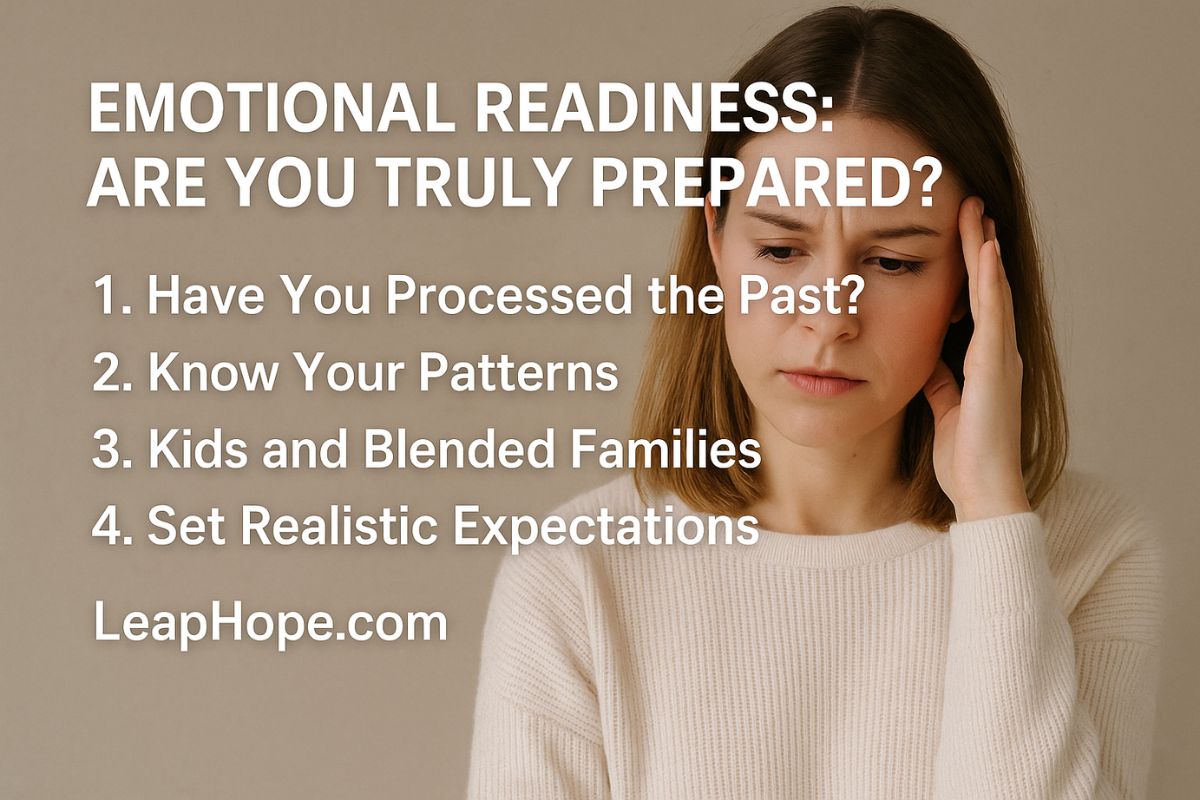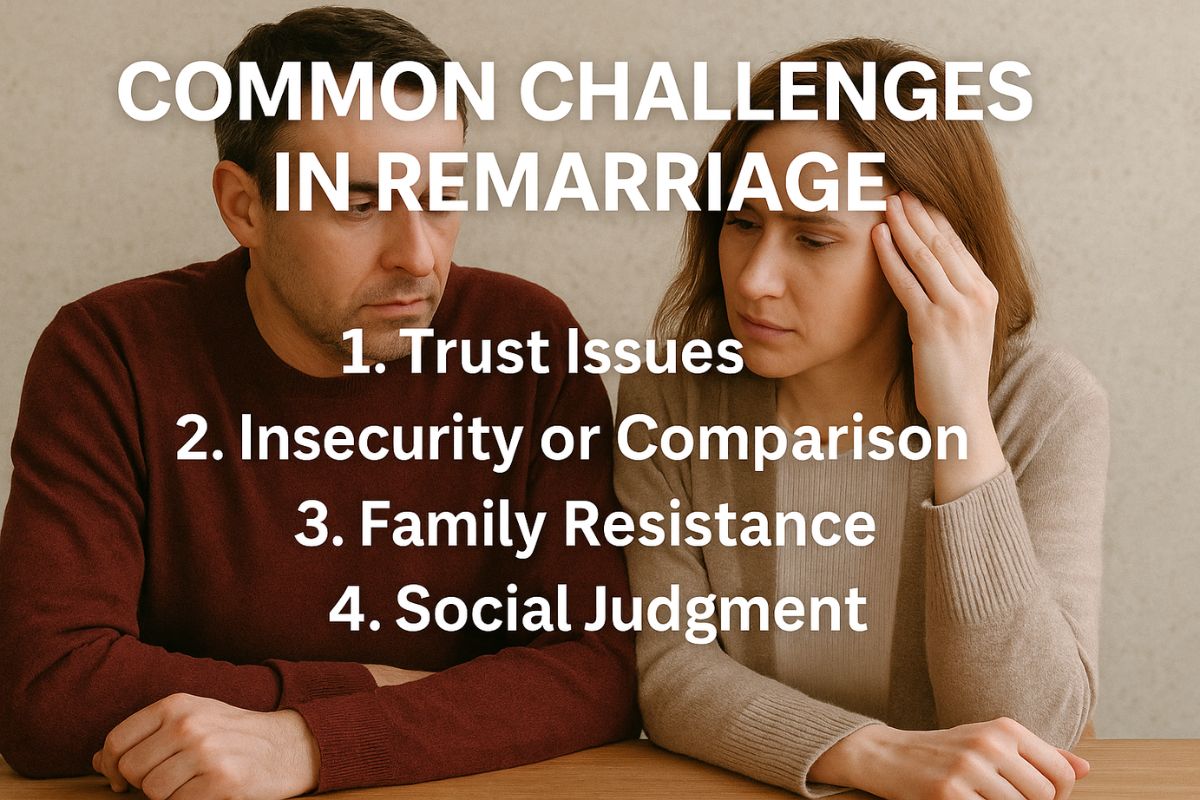If you’re thinking about getting married again after a divorce, the real question isn’t whether love is possible. It’s whether you are ready for marriage this time.
A lot of people remarry because life feels stable again, the relationship feels good, or the pressure to move forward is strong. That doesn’t automatically mean they’re emotionally prepared for commitment. Being able to love and being ready to build a marriage are two different things.
Preparing yourself for marriage after divorce means being honest about what you’re bringing with you, your expectations, your fears, your patterns, and the parts of your past that still affect how you show up in relationships. This isn’t about being “fully healed” or having everything figured out. It’s about knowing yourself well enough to enter marriage consciously, not on autopilot.
This article is for you if you’re open to commitment again but don’t want to repeat the same mistakes. It’s not about legal steps or wedding planning. It’s about emotional readiness, clarity, and whether you’re choosing marriage from stability rather than fear or pressure.
What Preparing For Marriage After Divorce Actually Means
If you’re honest, preparing for marriage after divorce probably doesn’t feel neat or confident. It feels like wanting something and questioning yourself at the same time. One part of you is hopeful. Another part is cautious, watching closely, wondering if you’re about to repeat something you promised yourself you wouldn’t.
Being ready for marriage isn’t about how good the relationship feels on good days. It shows up on difficult ones, when you’re misunderstood, triggered, or emotionally tired. It’s about whether you can stay present instead of pulling away, shutting down, or going into defence mode when things feel uncomfortable.
You can care deeply about someone and still not be ready for marriage. Readiness has less to do with love and more to do with self-awareness. Knowing how you react under stress. Knowing what you need. Knowing when fear is speaking louder than truth.
Preparing yourself doesn’t mean you’ve healed everything or figured life out. It means you’re willing to slow down and ask harder questions. Are you choosing commitment because it feels stable and aligned, or because being alone feels heavier than the risk of getting hurt again?
That difference matters more than most people realise.

Have You Truly Made Peace With Your Past, Or Just Moved Forward?
After divorce, it’s common to focus on moving forward. You rebuild routines, regain independence, maybe even feel happier than you did before. From the outside, it can look like you’re completely past it. But emotional closure doesn’t always move at the same pace as life.
You might notice this when certain conversations make you tense, when small disagreements feel bigger than they should, or when you feel an urge to protect yourself even with someone who hasn’t given you a reason to doubt them. These reactions don’t mean you’re broken. They usually mean parts of the past are still active, even if you don’t think about your ex anymore.
Making peace with your past doesn’t mean revisiting every detail or reopening old wounds. It means being honest about what still affects you. The patterns you learned, the fears you carry, and the boundaries you didn’t know how to set before. When those things remain unacknowledged, they often show up in new relationships without warning.
Before stepping into another marriage, it helps to ask yourself whether you’ve truly integrated what you went through, or whether you’ve simply adapted around it. One leads to conscious commitment. The other often leads to repetition, even when the person beside you is completely different.
Are You Choosing Marriage From Wholeness Or From Fear?
After a divorce, wanting stability again is natural. You may want a partner, a home that feels settled, or simply the comfort of not doing life alone. None of that is wrong. But it’s worth pausing to ask why marriage feels important right now.
Fear can be quiet. It doesn’t always show up as panic. Sometimes it sounds like, “I don’t want to start over again,” or “What if this is my last chance?” Sometimes it comes from family pressure, age, or the exhaustion of being on your own for too long. When fear is driving the decision, marriage can feel urgent rather than intentional.
Choosing marriage from wholeness feels different. There’s no rush to prove anything. You’re not trying to replace the past or escape loneliness. You’re choosing commitment because it aligns with who you are now, not because you’re afraid of being alone or left behind.
If you’re unsure which place you’re choosing from, that uncertainty itself is information. Readiness doesn’t mean having no fear. It means being able to recognise fear without letting it decide for you.
Do You Understand Your Relationship Patterns Now?
Before committing to marriage again, it’s worth looking honestly at what you tend to repeat in relationships. Not to blame yourself, and not to relive the past, but to understand it.
Patterns often show up quietly. Maybe you avoid conflict until resentment builds. Maybe you over-give and hope things will change on their own. Maybe you stay longer than you should because leaving feels like failure. These habits don’t mean you chose wrong before. They usually mean you were doing the best you could with what you knew at the time.
What matters now is whether you can recognise these patterns as they appear. Awareness changes how you choose, how you communicate, and what you tolerate. It helps you notice when something feels familiar for the wrong reasons, even if the relationship itself feels different.
Preparing for marriage after divorce isn’t about ensuring nothing ever goes wrong. It’s about knowing yourself well enough to respond differently when old dynamics try to return. That awareness is one of the strongest foundations a second marriage can have.

Can You Communicate Your Needs Without Shutting Down Or Over-Explaining?
After divorce, communication often changes. You may find yourself holding back to avoid conflict, or over-explaining because you don’t want to be misunderstood again. Both are understandable responses to past hurt, but neither creates emotional safety in a marriage.
Healthy communication isn’t about saying everything perfectly. It’s about being able to express what you need without fear of abandonment and to listen without becoming defensive. In second marriages, this matters even more because both people bring history with them, not just hopes.
Notice how you respond when something feels uncomfortable. Do you go quiet and pull away, or do you try to justify yourself until you feel exhausted? Preparing for marriage means learning how to stay present in these moments, even when your instinct is to protect yourself.
You don’t need flawless communication to be ready. You need enough awareness to pause, speak honestly, and stay engaged instead of disappearing emotionally. That ability makes everyday challenges easier to navigate and prevents small issues from becoming long-term distance.
Are Your Boundaries Clear, Even When It Feels Uncomfortable?
After divorce, boundaries stop being theoretical. They become necessary. Not because you want to push people away, but because you’ve learned what happens when your limits are ignored or unclear.
This includes boundaries with an ex-partner, especially if children are involved, but it also includes boundaries with family, friends, and even your new partner. Can you say no without feeling guilty? Can you hold your ground without over-explaining or apologising for your needs?
Clear boundaries don’t make relationships colder. They make them safer. They reduce resentment, prevent emotional spillover from the past, and help both people know where they stand. In a second marriage, boundaries protect the relationship from outside pressure and old dynamics.
Preparing yourself for marriage after divorce means being willing to feel a little uncomfortable in the moment so you don’t feel trapped or resentful later. If setting boundaries still feels frightening or wrong, that’s not a failure. It’s a sign there’s more to understand about your needs before committing again.
Are You Ready For Commitment, Not Just Companionship?
Companionship can feel easy after divorce. It brings comfort, laughter, and a sense of not being alone anymore. Commitment asks for more than that. It asks for consistency, emotional responsibility, and the willingness to stay engaged even when the relationship feels ordinary or difficult.
Being ready for marriage isn’t about how much you enjoy being with someone. It’s about how you handle responsibility when excitement fades or stress shows up. Can you remain emotionally present when things feel repetitive, tense, or inconvenient? Can you work through issues instead of mentally checking out?
After divorce, it’s tempting to avoid anything that feels heavy or demanding. That’s understandable. But marriage involves showing up on days that don’t feel rewarding, not because you have to, but because you choose to.
Preparing yourself for marriage means being honest about whether you’re ready for that level of commitment, not just the comfort of having someone by your side. There’s no shame in needing more time. Commitment chosen with clarity lasts longer than commitment chosen out of relief.
What Conversations Need To Happen Before Saying Yes Again?
Before committing to marriage again, there are conversations that matter more than chemistry or timing. Not because they guarantee success, but because avoiding them almost always creates problems later.
This isn’t about interrogating each other or turning your relationship into a checklist. It’s about being honest early, while things still feel open. What does marriage mean to each of you now? How do you handle conflict, money, family involvement, or emotional distance when it shows up?
If children are part of the picture, these conversations become even more important. Not the logistics, but the emotional expectations. How will responsibilities be shared? How will boundaries with an ex be handled? What kind of partnership are you actually building together?
Preparing yourself for marriage after divorce means being willing to talk about uncomfortable things before they turn into silent resentment. If certain topics feel impossible to raise, that’s information worth paying attention to. Marriage doesn’t require perfect answers, but it does require the courage to ask the right questions.

When Professional Support Can Help Before Remarriage
Getting support before a second marriage doesn’t mean something is wrong with you or your relationship. Often, it means you’re taking commitment seriously enough to slow down and understand yourselves better before making a long-term decision.
Premarital counselling after divorce looks different from first-time counselling. It focuses less on ideals and more on patterns, expectations, and emotional habits that quietly shape relationships. It gives you space to talk about fears, boundaries, and unresolved issues in a way that doesn’t turn into blame or conflict.
Individual therapy can also be helpful at this stage. Not to fix the past, but to clarify what you want to bring forward and what you don’t. It can help you recognise when old fears are influencing present choices and support you in entering marriage from stability rather than pressure.
Choosing guidance is not a sign of doubt. It’s often a sign of readiness. When you’re willing to reflect before committing again, you give yourself and your future relationship a stronger, more honest foundation.
Final Thoughts: Preparing For Marriage Is An Act Of Self-Respect
Choosing to marry again after divorce isn’t about proving that the past didn’t hurt or that you’ve moved on perfectly. It’s about deciding, with clarity, how you want to show up in commitment now.
You don’t need certainty to be ready. You need awareness. You need to know what you’re bringing with you, what you’re no longer willing to carry, and what kind of partnership you want to build moving forward. Taking the time to prepare yourself isn’t a delay, it’s a form of self-respect.
If you notice hesitation, questions, or discomfort as you think about remarriage, that doesn’t mean you should stop. It means you’re paying attention. Commitment chosen consciously, rather than out of fear or pressure, creates marriages that feel steadier and more honest over time.
When you say yes again, let it be because you understand yourself better now, and because the choice feels grounded, not rushed.
Explore online marriage counselling with LeapHope and take this step with clarity, not guesswork.

Preparing for marriage after divorce often involves understanding how past relationships affect emotional patterns and attachment, something widely discussed in research on the psychological effects of divorce, as outlined on Wikipedia.
FAQs About Preparing For Marriage After Divorce
How do I know if I’m emotionally ready to marry again?
You’re likely ready when the idea of marriage feels steady rather than urgent. You’re not trying to escape loneliness, prove anything, or rush toward security. You can reflect on your past without being overwhelmed by it, and you’re able to talk about needs, fears, and boundaries openly.
Is it normal to feel unsure even if the relationship feels right?
Yes. Uncertainty doesn’t mean something is wrong. After divorce, hesitation often comes from awareness, not fear. The key question is whether your doubts invite reflection or keep you stuck in avoidance. Healthy readiness allows space for questions without letting them control your decisions.
Do I need to be completely healed before getting married again?
No. Complete healing isn’t realistic. What matters is whether you’re aware of what still affects you and how you manage it. Marriage doesn’t require perfection, but it does require emotional responsibility and the ability to stay present when old triggers surface.
Should premarital counselling be different after divorce?
Yes. Premarital counselling after divorce focuses less on expectations and more on patterns, boundaries, and emotional safety. It helps you understand what you’re bringing into the relationship and how to build something different, rather than repeating what didn’t work before.
What if my partner hasn’t been divorced and doesn’t fully understand my fears?
That difference doesn’t have to be a problem, but it does require honest communication. What matters most is whether your partner is willing to listen, learn, and respect your boundaries. Feeling emotionally safe with someone who hasn’t shared your experience is often more important than having identical histories.
Is it okay to take more time, even if everything seems fine?
Absolutely. Taking time doesn’t mean you’re unsure, it means you’re intentional. Marriage entered thoughtfully tends to feel calmer and more secure over time. There’s no deadline for readiness, and slowing down now often prevents regret later.




